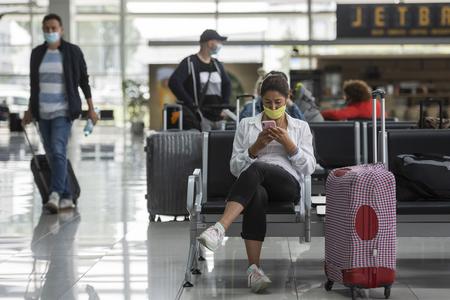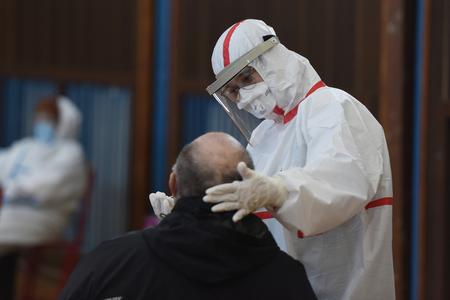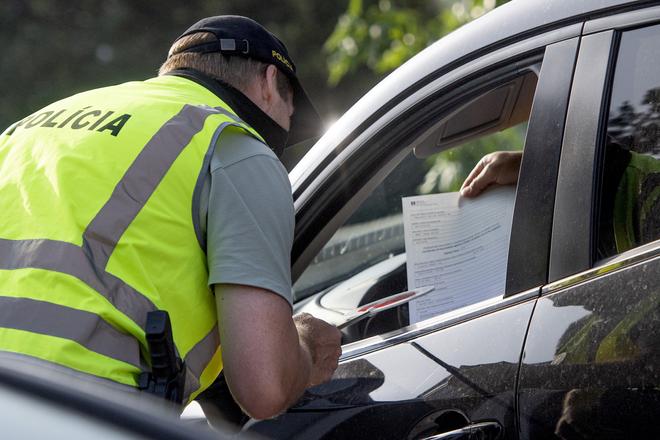The rules for entering Slovakia from abroad will change, benefiting vaccinated incomers.
Our paywall policy
The Slovak Spectator has decided to make all the articles on the special measures, statistics and basic information about the coronavirus available to everyone. If you appreciate our work and would like to support good journalism, please buy our subscription. We believe this is an issue where accurate and fact-based information is important for people to cope.
Unvaccinated people coming to the country after July 9 will be required to register with the eHranica online formand then self-isolate.
Those who have been vaccinated will have exception and can avoid self-isolation but they need to register within eHranica, too. Unvaccinated cross-border commuters and unvaccinated children can expect changes, too.
“Anyone fully vaccinated returning to Slovakia from abroad will be automatically exempted from self-isolation and testing because he or she will be able to prove vaccination through a European or national Covid certificate,” State Secretary of the Foreign Affairs Ministry, Martin Klus, wrote on Facebook.
Instead of the list of green, red and black tier countries, the Health Ministry and the Foreign Affairs Ministry will prepare a list of high-risk countries that it recommends against travelling to. It will be updated on a weekly basis.
It contains the same countries that were identified as black-tier, or “no go” states. In the current valid list, Italy was added to the high-risk countries.
How the rules for incomers will change
Starting on Friday, July 9, Slovakia will no longer use its travelling traffic light system.

Instead, unvaccinated incomers to Slovakia will have to register with the eHranica online form (children up to 12 and people who transit Slovakia are exempt, as well as lorry transport crews, bus drivers, plane crews, boat crews, engine drivers, train crews and service staff of train transport, health service personnel transporting patients, blood or transplant organs, funeral service employees who conduct the international transport of human remains for burying and cremation) and show confirmation of registration at the border check. They will subsequently have to self-isolate. They can take a PCR test five days after their arrival and if the test is negative, end their self-isolation.
Fully vaccinated people will have an exception from self-isolation. They do not have to register every time they enter the country, unlike unvaccinated people. The first registration is valid for six months. They will not be asked to register, but will have to show a certificate of vaccination (EU or national) at the border check.
For people vaccinated with the first dose of the vaccine and people between the ages of 12 and 18, their initial registration on eHranica is valid until August 9. People who have permanent or temporary residence in Slovakia and work in neighbouring countries, in the EU, Norway, Switzerland, Iceland or Lichtenstein and who have visited in the last 14 days only these countries for work have to register with eHranica only once; registration is valid until September 1.
The same applies to cross-border commuters who have residence in the EU, Norway, Switzerland, Iceland or Lichtenstein and in case of Ukraine up to 100 kilometres from an open border crossing and travel to Slovakia to work. One registration is also valid for Slovak citizens who live in the neighbouring countries up to 100 kilometres from an open border crossing until September 1. These people have an exception from quarantine until September 1 but they have to have confirmation from an employer about place of work and RT-PCR test not older than seven days.
A person is considered fully vaccinated if:
in the case of two-dose vaccines: 14 days have passed since receiving the second vaccine shot (but no more than one year);
in the case of one-dose vaccines: 21 days have passed since receiving the vaccine shot (but no more than one year);
in the case you recovered from Covid: 14 days have passed since receiving the first vaccine shot within 180 days since recovering (but no more than one year).
only until August 9: after application of the first dose of vaccines against Covid-19 of one-dose or two-dose vaccine (immediately after the first dose)
The Public Health Authority recommends using the EU digital covid certificate but it is also possible to show confirmations from other countries. The confirmation has to be in the Slovak, Czech or English language.
The rules will also change for unvaccinated children. Those aged 12-18 will have a transitional period between July 9 and August 9, during which they will follow the same quarantine rules applied to their parents (so if their parents are vaccinated, they can avoid self-isolation).
Starting on August 9, vaccinated children will be able to avoid self-isolation.
Children younger than 12, who are not eligible for Covid vaccination for now, will follow the same quarantine rules as their parents.

Between July 9 and August 9, cross-border commuters will be required to show a negative PCR test no older than seven days when crossing the borders.
After August 9, vaccinated cross-border commuters will be allowed to avoid isolation (but they need to show a certificate of vaccination). Unvaccinated cross-border commuters will be required to register and self-isolate (ends after receiving a negative PCR test result for a test taken five days after arrival).
More details should be specified by the Public Health Authority (ÚVZ) in the coming days.
Obligatory self-isolation
All unvaccinated people who enter Slovakia from July 9, 6:00, will have to undergo quarantine, which will end automatically after 14 days if you have no symptoms.
It is possible to shorten the time spent in quarantine if a person is tested no earlier than on the 5th day after arrival with a PCR test. It is not necessary to test children younger than 12; quarantine will automatically end when their accompanying adults test negative. Quarantine is also valid for every member of the household, even if they did not travel. They are able to leave quarantine when other members do.
Quarantine is not obligatory for fully-vaccinated people. A temporary exception, until August 9, applies to youngsters between the age of 12 and 18.
Quarantine is not obligatory for people who cannot be vaccinated from health reasons but they must have confirmation of this along with a negative RT-PCR test result no older than 72 hours.
Groups of people with exceptions – for example, drivers, flight crews, train staff, and funeral service workers – still have to register within eHranica.
Delegations representing Slovakia, MEPs or employees of international organisations have to show a negative RT-PCR test result upon arrival no older than 72 hours.
People taking others to/from international airports in the Czech Republic, Poland, Hungary and Austria do not have to self-isolate. These people are required to fill in the form on the Naletisko.mzv.sk website and show a confirmation of this registration plus a copy of the plane ticket of the transported person on borders. No stops are allowed, apart from those to refuel and the time a transported person needs to board/get out of the vehicle.
The obligation to quarantine also applies to people who enter and leave Slovakia for the purpose of marriage, including close people of the engaged couple. An exception remains for short-time entrance to Slovakia for the funeral of a close person, but an unvaccinated person has to have RT-PCR test result no older than 72 hours.
Students entering the territory of Slovakia who are over 12 years of age and attend kindergarten, primary, secondary or higher educational institutions in neighbouring countries (or, conversely, reside in these countries and attend school in Slovakia) do not have to undergo quarantine if they have a full-time certificate and a negative RT-PCR or antigen test result no older than 7 days. These conditions also apply to an accompanying person, who, in addition to a negative test, must have a certificate of the accompanying person's status. The Public Health Authority emphasises that students can cross borders for active study (that is, full-time teaching must take place; students cannot apply the regime during the period when it is interrupted, such as during the summer holidays).
Entering Slovakia by plane
When flying to Slovakia, there are special conditions to follow. They apply only when flying to Slovakia, not close to neighbouring airports in Budapest, Vienna, etc.
Every person has to fill in a document at https://www.mindop.sk/covid/. The Public Health Authority put together a list of several countries. When arriving from countries that are not on the list, it is necessary to have a negative RT-PCR test result no older than 72 hours. This condition applies to vaccinated people too. Children under 12 are exempt from PCR tests when arriving by plane in countries that are not on the list issued by hygienists.
List of the countries from which is not necessary to have negative test: Albania • Andorra • Armenia • Australia • Austria • Azerbaijan • Belarus • Belgium • Bosnia and Herzegovina • Bulgaria • Canada • China • Croatia • Cuba • Cyprus • Czech Republic • Denmark • Estonia • Finland • France • Georgia • Germany • Greece • Hong Kong • Hungary • Iceland • Ireland • Israel • Italy • Japan • Jordan • Kosovo • Latvia • Lebanon • Liechtenstein • Lithuania • Luxembourg • Macau • Malta • Mexico • Moldova • Monaco • Montenegro • the Netherlands • New Zealand • Northern Macedonia • Norway • Poland • Portugal • Romania • San Marino • Serbia • Singapore • Slovenia • South Korea • Spain • Sweden • Switzerland • Taiwan • Turkey • Ukraine • USA
Motivation for getting vaccinated
The change of rules is one way the government wants to motivate people who are hesitant about vaccination to get a jab, Klus continued.
It has been proven by scientists that vaccinated people are less likely to carry the coronavirus, and if they are infected, the course of the disease is less dangerous than in the case of those not vaccinated, he noted.
Health Minister Vladimír Lengvarský (OĽaNO) confirmed in an interview for the Sme daily that unvaccinated people will be able to cross the border only if they show confirmation of registering with the eHranica form and a booked appointment for their PCR test.
If the test result comes back negative, they will be allowed to end self-isolation, he added.
Three-tier border alert system
Slovakia will also change its system of border checks. It will follow a new alert system, divided into three tiers that will determine the intensity of border checks:
Green tier: police will monitor and carry out random checks of incomers on the border crossings or close to the borders; specific hours will not be defined. There will be no limitations for border crossings;
Orange tier: police in cooperation with the armed forces will check most incomers to Slovakia at certain hours (truck transport has an exception). Some smaller and less important border crossings could be closed;
Black tier: police in cooperation with the armed forces will check everybody coming to Slovakia from abroad 24/7 (truck transport has an exception). Smaller and less important border crossings will be closed or the cabinet will pick which border crossings can remain open.

The proposal to remain in the same tier or switch to another tier will be submitted by the health minister to the cabinet session every week.
Starting on July 5, Slovakia will be in the orange tier, meaning there will be intensive border checks at certain times.
Air transport risky
The Health Ministry warns that the possibility of getting infected with the Delta variant increases the risk of travelling my plane.
As a result, it proposes to condition flights with negative PCR test results no older than 72 hours which the passengers would be required to show when entering Slovakia.
“Such a measure requires a legislative change through the Transport Ministry that would oblige the air companies to ask passengers for a confirmation of a negative PCR test result as part of the pre-boarding procedures,” reads the document submitted for the cabinet session.
Transitting Slovakia is still allowed; however, only select routes are possible to use for transit.


 Illustrative stock photo (source: TASR)
Illustrative stock photo (source: TASR)